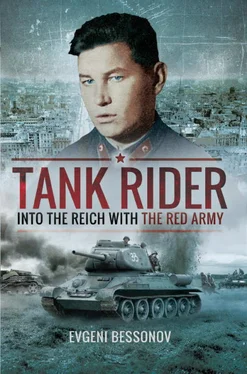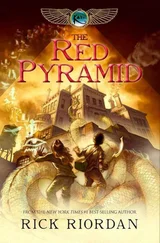Vyunov arrived with his platoon, but he acted smarter – he did not move along the asphalt highway, but moved a bit to the right and advanced through a young forest. Eventually his soldiers also had to lie down in front of the village. Chernyshov came running; I had not seen him for a long time. As always, he started to shout: ‘Forward, Bessonov, forward!’ I told him: ‘Wait, Nikolai, look around. Can’t you see the mines on the road and snipers firing? Vyunov’s position is better now, he should attack the village.’
We shouted ‘Forward!’ to Vyunov, but either he did not hear us or was also pinned down by snipers, but at all events his soldiers remained on the ground. Chernyshov wanted to run there, and I tried to talk him out of it, putting it bluntly: ‘They will kill you.’ I recommended he go back and bring up the heavy JS-2 tanks, but Chernyshov did not listen to my advice: he jumped up and before he made two steps from the ditch, a shot sounded in the air and Nikolai fell down. We pulled him into the ditch and bandaged him. He was wounded in his chest. After that we carried him at the rear. All this time Chernyshov was unconscious. This incident happened around 8 or 10 February and he had to stay in hospital until 18 April, 1945.
A JS-2 tank drove up to us at that moment. The soldiers indicated targets to the tank commander and the tank fired its 122 mm gun. All of a sudden I saw three German self-propelled guns (we also called them assault guns) rushing out one by one from behind the houses several metres from us. Our tank opened fire on them, but they quickly disappeared behind a bend of the highway. I got my soldiers to attack, and shouting ‘Forward, follow me, forward!’ I ran along the ditch, jumping across the detonation wires of spring -mines (what an idiot!). The soldiers were smarter than me and ran on the field to the right and left from the highway, there were no mines there. We rushed into the village; Vyunov and his platoon also broke into the houses on the outskirts of the village. The enemy fled. My men searched the houses, but they were abandoned – not a single human soul was there. We waited for the battalion commander with his staff. He already knew about Chernyshov’s wound. After that T-34 tanks with Major Stolyarov, commander of the tank regiment, arrived.
Battalion commander Major Kozienko called me up – political officer Gerstein and the battalion’s chief of staff, Captain Grigoriev, were also there. Kozienko told me that they had decided to appoint Senior Lieutenant Grigori Vyunov the company commander in place of the wounded Chernyshov.Vyunov had arrived at the battalion as late as October 1944 and was five or six years older than me. I replied to Kozienko that I had been in the battalion from August 1943, that it was my fourth operation, and I was always the last officer to remain in the company, de facto leading the company and did not I deserve to become the company’s commander? Major Kozienko told me that he made the decision jointly with Gerstein and Grigoriev and that it was not just his decision. So, I again remained platoon leader. Somehow I was not very lucky when it came to promotion.
The following battles were very hard for us and we were losing a lot of men. The Germans threw Volkssturm (the German Home Guard – translator’s note) against us – old guys and young boys armed with Panzerfausts , who resisted most stubbornly. Sometimes they fought to the last man. Every day we had losses in men and equipment. We could achieve almost no deep penetration into the German rear, as we had in the Ukraine and Poland. Battles took place day and night, and this really exhausted us. The battalion attacked as a concentrated task force with all three companies, or all that remained of them. The Germans, in turn, only retreated to consolidate their positions at another place that was prepared for defence.
The population fled from us. Traces of panic flight were everywhere – we saw cases, bicycles, pillows and other things in the ditches. All villages, both small and large, were abandoned, no one stayed behind. Cattle, poultry and other things were left behind, so we did not stay hungry. On the contrary, we ate as much as we could cook during short breaks. Once our column caught up with fleeing local civilians. It was a column of stiff old men, children and women of different ages. Some travelled on carts, some walked and pushed carriages with their belongings that they could carry, some had back-packs on their backs. We stopped all those people and in our broken German explained to them that they should go back to their homes. The battalion travelled on in order to complete the mission, and we do not know where the Germans went – we had other things on our minds.
We never harassed German civilians. We did not rob them, did not search them and did not take anything away. To be honest, I was very strict about this with my soldiers, and I think that other officers were also of the same opinion. We did not rape women, or at least, such things never happened in our company or battalion. The senior officers were also very strict about such things both in the battalion and the Brigade. Besides that, I personally warned many soldiers about my strictness in this respect. Not only in my company, but also in the other companies of the battalion they knew about my attitudes and even the most notorious soldiers were afraid of me. Why? I was the veteran of the battalion, I had been through it all, and there had been a lot of rumours, known as ‘soldier’s radio’, about my strictness. Even the most undisciplined and impudent soldiers didn’t mess with me. Many times I heard: ‘Bessonov is coming!’ – especially after a rumour that I almost executed a soldier for disgraceful behaviour. This thing did not take place in reality, but there was a rumour, and some believed it.
It was a cloudy day, sleet was falling, and it was quite chilly on the tanks. Everyone was trying to get closer to the tank’s radiator – bad weather for infantry. During 9 and 10 February the enemy put up stubborn resistance, throwing armour, infantry and Volkssturm into action, raining shot and shell on us. We had a hard time, but the enemy’s resistance was broken and after taking losses the Germans had to withdraw, leaving heavy equipment and weapons behind – tanks without fuel, artillery and mortars. We were in the middle of a forest; sometimes one could not see where Fritzes’ fire came from. Tanks moved forward carefully, following the tank riders – our task was to destroy German Panzerfaust teams with small arms or indicate Fritz targets to the tanks, so that they could destroy them with main guns. The enemy tried to stop our advance by all means, laying ambushes – sometimes with very small groups, which was almost a suicide mission with its only goal being to stop us and inflict casualties on us. One evening, just when it started to get dark, the three vanguard tanks approached the edge of a forest. My platoon and I were in the middle of the advancing tank column, while a group of soldiers from another company was in forward security. All of a sudden several artillery shots shook the air and the column stopped. I jumped off the tank and ran forward to find out what had happened. It got completely dark, but I saw a group of commanding officers, among them the commander of the tank regiment, Stolyarov, battalion commander Kozienko and others. Soldiers from the three first tanks ran back from the forest edge and brought a heavily wounded soldier on rain cape. The soldier died soon after the incident. According to the soldiers, at the forest edge they came under fire from German assault guns. One of our tanks was knocked out, almost an entire escorting tank rider squad died, and only a few wounded survived. Two other tanks tried to evade fire. One crew abandoned their vehicle, but the driver went into reverse, and the tank rolled backwards without the crew. The regiment commander ordered the tank to be stopped and brought back to the column. The order was carried out.
Читать дальше












